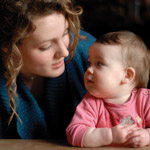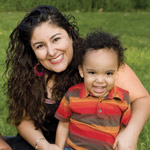Real People Real Stories
Behind each adult, child and family we serve lies a real story- stories that bring to life the true meaning hope, change and possibilities.
Joseph’s Story
 Sixty five year old Joseph became homeless in 1988 after a devastating fire destroyed his home and belongings of 25 years. With no family to turn to for help, he moved around finding shelter in the woods and abandoned buildings. For the past 10 years he called a small space under a bridge in Mercer County his home. This is where Joseph’s story begins to turn from tragedy to hope.
Sixty five year old Joseph became homeless in 1988 after a devastating fire destroyed his home and belongings of 25 years. With no family to turn to for help, he moved around finding shelter in the woods and abandoned buildings. For the past 10 years he called a small space under a bridge in Mercer County his home. This is where Joseph’s story begins to turn from tragedy to hope.
Our Project for Assistance in Transition from Homelessness (PATH) program first met Joseph in January of 2016. PATH provides outreach services to homeless adults with a serious mental illness with the goal of linking them to housing and formal mental health treatment. By March he agreed to services but was not yet ready for housing. Over the years, he transformed his space under the bridge to make it his own with organized sections to hang clothes, line up shoes and store food. He was comfortable and the thought of leaving his “home” was very scary.
PATH educated Joseph about all the positives that would come with housing and encouraged him to look at options. They found an apartment five minutes from the bridge that would make the transition a little easier. Thanks to the determination of PATH team members, on November 1, 2016 Joseph moved into his own apartment where he was able to celebrate his first Thanksgiving since 1988!
Leaving his familiar setting was extremely challenging at first, but now Joseph shares, “I’m happy here. I can promise you won’t find me at the bridge anymore!” Finding housing provided him with the safe, stable environment he needed to work toward a healthier future. Joseph now receives mental health treatment and looks forward to reaching his wellness goals.
On that night in 1988, Joseph lost more than just his home and belongings- he lost his sense of dignity. The PATH program works tirelessly to engage homeless adults like Joseph by visiting local shelters, transportation centers, parks, waterfronts and tent cities in Camden and Mercer Counties. In 2016, the program served 212 individuals and 38 were connected with permanent housing. Just one more outreach can mean the difference between a person lost and a full, meaningful, productive life.
Jamie’s Story
 Thirty-one-year-old Jamie lives with a developmental disability and also struggled for years with suicidal ideations and psychiatric hospitalizations. Living independently and maintaining interpersonal relationships was extremely difficult due to challenges with a personality disorder and bipolar disorder. For much of her life, Jamie yearned to find independence.
Thirty-one-year-old Jamie lives with a developmental disability and also struggled for years with suicidal ideations and psychiatric hospitalizations. Living independently and maintaining interpersonal relationships was extremely difficult due to challenges with a personality disorder and bipolar disorder. For much of her life, Jamie yearned to find independence.
In 2008, Jamie entered our Supervised Apartments where she started to learn coping and anger management skills. The program provides adults with developmental disabilities the necessary daily living skills to function on their own with minimal assistance such as meal preparation, medication administration, household upkeep and community integration.
Today Jamie can proudly say that she has not had any hospitalizations in nearly ten years and no longer experiences thoughts of suicide. With daily encouragement, she now maintains her apartment with minimal help from staff, responsibly takes her medication and advocates for overall health and wellness. Jamie also sustains two jobs which allow her to function independently in the community.
This past May, Jamie and her long-term boyfriend, Raul, held a beautiful, intimate ceremony as a symbol of their love. The couple’s ability to maintain a stable relationship symbolized the icing on the cake to celebrate Jamie’s road to independence! In the future, she looks forward to living with Raul, raising a family and taking a Disney Cruise with a guided tour. Jamie’s story shows that with stable housing and wraparound services, the road to independence is possible.
Kimberly’s Story

Despite these difficult challenges, Kimberly continued to attend school and became involved with the School Based Youth Services Program. She now receives counseling and participates in psychoeducational groups to help cope with past trauma. This has allowed her to focus more on her overall health and grades. Groups revolving around healthy relationships and social skills have helped Kimberly learn to manage her emotions.
The barriers Kimberly faces can be overwhelming, but with the right support system in place her confidence continues to grow. Instead of looking at the past, she looks forward to new opportunities and continuing her education.
 Anthony’s Story
Anthony’s Story
When the Behavioral Health Home (BHH) opened in October of 2015, the program was proud to welcome 58 year old Anthony as one of their first clients. Anthony had struggled for years to manage his mental illness which left him little time to concentrate on his physical health.
Almost immediately, Anthony began actively taking control of his health by participating in events and activities offered at BHH. With motivation from staff and fellow BHH peers, he took part in nutrition classes, exercise groups and connected to a primary care doctor. His improvement did not end there!
Anthony became involved with Reach Out Speak Out Trenton, a collaborative support program which gives a safe place for people with mental illness to meet and socialize.
Reach Out Speak Out organizes field trips and provides transportation for those who attend. The organization was so impressed with Anthony’s dedication, they offered him a job as a van driver. He now works part-time and continues to receive services from BHH. For the first time in years, he feels happy, healthy and in control of his life.
Alan’s Story

Alan was alone, unsure of his future and needed help. He began attending the RITE Center on a regular basis. At first, Alan was reserved. Slowly, Alan began to emerge from his shell, reaching out to staff more and in turn providing support for other consumers at the RITE Center.
After living in the shelter for several months, Haven was able to place Alan in his own condo. It was after the move that RITE Center staff saw a shift in Alan’s attitude. Alan started to become the natural leader that he has always been. Many members now look to him as an example of perseverance and seek him out to get guidance from him. He now helps facilitate groups, coordinate outings and does weekly outreach to engage potential new members. The RITE Center provided support to him and he shared he just wants to give to others what was given to him.
Nancy and Connor’s Story

Seven years later, at age 11, Connor is hyperactive and physically aggressive. He displays self-abusive injuries and frequently throws tantrums. Conner requires assistance with daily living skills and is not toilet trained. Also, he is non-verbal and requires constant supervision.
Nancy learned about the Oaks Integrated Care Bridging Family Support program and reached out to us. The team collaborates with Conner’s school and therapists to teach the family alternative ways of working with him. Every day the support person goes to their home to get Conner off the school bus and the lessons begin. After only 4 weeks, Conner has reached so many personal achievements, including a decrease in self-abusive injuries and an increase in bathroom use. The family is learning a great deal from his support specialist like how to model communication, block aggressive behaviors and ignore other behaviors to show Conner what is expected of him. The family is aware that it takes little steps, but they are walking toward future independence.
Henry’s Story

After graduating from the MICA program, Henry transitioned to our Adult Outpatient Program (AOP). Henry remained strong in his sobriety, supported Donna through her pregnancy and celebrated the birth of their daughter. Donna, however, continued to struggle with her depression making Henry the sole caretaker for their daughter, Henna.
Henna, now four years old, has a loving father who never complains about being a single father. Henry takes his parenting responsibilities seriously and knows that he must take care of himself to give Henna the best care possible. Therefore, Henry continues his work with AOP. He visits the psychiatrist every two to three months for medication monitoring, attends individual counseling sessions and utilizes case management. He expresses his gratitude to the AOP staff every time he visits stating that “AOP gave him the coping skills needed to raise Henna.”
Jeff’s Story

With the help of Oaks Integrated Care staff, Jeff began to adjust his behaviors. The staff created and adhered to a daily schedule, found and placed Jeff at the right school and employed plenty of positive reinforcement. Today, Jeff thrives in his new environment. Not only is he happy and active, he seeks attention in positive ways from others, like giving hugs, touching your arm, and expressing his needs. Jeff also conquered his fear of other males and going on outings.
Through it all, Jeff has become more independent. He cleans his own room and even helps staff with the laundry.
In less than 1 year, Jeff has made tremendous progress and his future looks bright.
Juan’s Story

Eventually, after Oaks Integrated Care staff showed Juan that Hattie Tally is a safe place to share emotions, thoughts and opinions, Juan became more comfortable. He began volunteering to speak during group counseling and proudly shared his perspective. He engaged in group discussions and occasionally offers feedback even when he is not prompted. During his psych appointments, he proudly shares with the doctor the changes he’s experienced in group.
Juan is living with his younger sister and brother-in-law, and they are seeing a change in Juan as well. Juan’s sister was finally able to engage him in family activities. Prior to this time, Juan would isolate himself from family members and would remain in his room. They also began assigning Juan’s “chores” around the house, like cleaning the bathroom, doing his laundry, and light home repair under his brother-in-law’s supervision. Recently, he shared that he and his brother-in-law went shopping for supplies for the victims of Hurricane Sandy. He was very excited about being able to help others and the time spent with his brother-in-law and proudly shared this story in group.
After developing trust with the Hattie Tally staff, Juan’s confidence grew in the program and then again at home. His increased confidence level means he feels more comfortable sharing with his peers and especially staff members. Overall, Juan is living a more fulfilling life in program and at home.
Lily’s Story

After speaking with Oaks Integrated Care staff, Lily was temporarily placed in a Oaks Integrated Care group home. Lily’s therapist quickly set about introducing a feelings vocabulary to assist Lily in expressing herself and the feelings she had suppressed surrounding her parents’ divorce. Lily worked with her therapist and her mother during family therapy sessions. During these sessions Lily and Sharon learned new tools to allow better communication regarding their emotions.
Lily was successfully discharged into her mothers’ care. Recently, Sharon shared with Oaks Integrated Care staff that Lily is continuing to use the tools they learned in therapy together as a family. Now, Lily is blossoming at home and school.
Lindsey and Sofia’s Story

This is a difficult transitional time for Lindsey and Sofia, and therefore they’ve enrolled in the Oaks Integrated Care FLEX program (Families Living in Extreme Stress) to deal with the emotional trauma they’re dealing with. The FLEX program offers Lindsey and Sofia therapy, mentoring services, respite and behavioral assistance. Lindsey has limited transportation so staff also helps Lindsey get to and from our Food Pantry and Sofia’s medical appointments. Lindsey is also learning from Oaks Integrated Care staff how to deal with her emotions more effectively, as well as parenting skills and techniques – things that Lindsey never learned as a child.
The challenges Lindsey faces can be overwhelming, but with the help from Oaks Integrated Care, Lindsey is learning more and more each day and now, the future for Lindsey and Sofia looks bright.
Maguelle’s Story

Maguellage made the decision to do everything possible to successfully reunite with her children but without a positive support system she struggled to meet the requirements. With little hope, she enrolled in the Intensive Supervised Visitation program at the Charles Yates Center for Children and Families.
In the Intensive Supervised Visitation program, Maguellage received case management services and successfully completed the Nurturing Parenting program. She enrolled in a Medical Assistant program to begin a career and create financial stability for her family. Determined to succeed, she graduated this spring with a high grade point average and quickly secured a job. From there, Maguellage moved into a stable housing environment through the Haven program.
During her time with Oaks Integrated Care, Maguellage has shown remarkable improvement in her parenting ability and maturity level. Recently, she was proudly reunified with her children. Today, the family receives therapy with our Family Preservation Services program and her daughter, Chanelle attends our First Step pre-school program. Despite the challenges she faced, Maguellage found the courage and drive to turn her life around.
Margie’s Story

When Margie first arrived, she spoke to the EISS staff about everything she was going through. The staff assured her things would be OK and linked her to the resources she needed. Staff took her to the Oaks Integrated Care Food Pantry and introduced her to a doctor. Margie spoke with the doctor about everything going on in her life and he prescribed a medication to help her.
As the weeks passed, Margie began feeling better and better. She attended the groups and says, “Each time I felt that I had listening ears, and the people listening actually cared about me.” She appreciate all the help EISS provided and plans on attending the future groups and hopefully become a volunteer.
Mia’s Story

Mia was placed with a foster mother, Jennifer. Jennifer and Mia’s bond grew quickly. Mia loved having her own room and a permanent, reliable adult in her life. After being her foster mother for nearly a year, Jennifer decided she wanted to adopt Mia.
At this time, Oaks Integrated Care PACS program, which offers short term, home based counseling to children referred by the Division of Child Protection & Permanency, began to work with Mia. The program offered Mia specialized, therapeutic services exploring her feelings of separation and loss. Together, Jennifer and Mia learned to cope with the issues that still linger from Mia’s past.
It hasn’t been an easy road, but now, Jennifer and Mia will share the journey together. Jennifer and Mia look forward to the quickly approaching adoption day, when they will legally be mother and daughter, and they are a “forever family”.
Olivia’s Story

Because of her unstable past, Olivia was extremely apprehensive about moving into a group home setting, but with staff encouragement she made the transition. Angry and guarded, she declined to talk to staff and expressed no interest in building a relationship with her roommates. She refused to engage in any community activities and isolated herself to her bedroom.
Thanks to the determination of Oaks Integrated Care staff, Olivia’s social skills have improved dramatically. She has formed friendships with several of her roommates and positive therapeutic relationships with staff. While before Olivia struggled to look a passerby in the eye, she now likes to go for walks and even stops to chat with the neighbors. She gets excited to attend community outings and participate in group activities.
Olivia’s ultimate accomplishment came during a recent celebration. To everyone’s surprise, she stepped right out on the dance floor and even sang a song for everyone. Tears glimmered in the eyes of staff that night as they recognized her undeniable growth.
Paul’s Story

After a few months with a one-on-one staff member and behaviorist, we slowly began to see improvements. He started to show more affection, participate in program, and now tries to jump in on conversations whenever he gets the chance. Staff at the program were thrilled when they realized Paul loves to sing and enjoys dancing to anything upbeat. In fact, he often takes the stage as the star of the show at the program talent show and holiday parties.
Paul is also more active at home and even volunteers to do chores. One of his new favorite hobbies is reading, which he learned to do at Pat Lebon using an interactive storybook reader. Since he has shown such great adjustment, we believe he will soon no longer need a one on one staff. He put his trust in our staff and we will continue to put our trust in his strengths and abilities. The possibilities are endless.
Ricky’s Story
Ricky enrolled in the Young Adult Transition Program (YATP) after hearing voices and having suicidal thoughts. He credits the staff in YATP for bringing awareness to his diagnosis, showing him he is not alone and teaching him how to cope with his mental illness. Ricky explains, “I was always a loner. I’ve improved on that. I’ve come a long way. I’m glad I know I fit in at Oaks Integrated Care.”
YATP staff also recognized Ricky’s natural leadership, pleasant demeanor and eagerness to learn and encouraged him to work with the Prevocational Team, a program that gives Oaks Integrated Care consumers the opportunity to learn job skills. As expected, Ricky flourished in his new job and his employment has been instrumental in leading a more independent life-style. Ricky’s self-motivation will help him through this transitional period of his life, but he attributes much of his success to YATP.
Ricky chooses to focus on his future and the personal goals he sets for himself. He shares, “I do have a dream of getting better and learning to deal with things. I also dream of becoming someone important like a counselor, maybe get married and have kids.”
Tamara’s Story

Furthermore, the motel Tamara was staying at was not close to any grocery stores. Her only “kitchen” amenities were a tiny refrigerator and a microwave. Cooking healthy, affordable meals was a challenge. In addition to Tamara’s mental health issues, she has several serious, chronic medical conditions which inhibit her mobility and some days she must use a cane.
Oaks Integrated Care recently placed Tamara in a one-bedroom condo. Suddenly, Tamara has the security of knowing she has a permanent home, as long as she continues to abide by the rules. The location of her condo is close to her group and individual counseling locations. Also, the move brought her closer to her family and she can now see them more often. Tamara is also flourishing at the Hattie Talley program and she invites her new friends to visit her at her new home. A case manager checks in on Tamara every week and takes her shopping whenever she needs to go.
With secured housing, the loneliness, the isolation and the insecurity Tamara felt in the past is over. Tamara attributes her improved mental health to her new living situation and looks forward to living a productive life again.
Tracy’s Story
Tracy started her journey to recovery in Oaks Integrated Care’s MICA in the spring of 2008 a much different woman than she is today. Tracy explained, “I didn’t talk to anyone. I didn’t want anyone to talk to me. I didn’t smile. I decided to ‘play it safe’.” Confused, guarded and skeptical, Tracy suffered from severe depression and a compelling addiction.
Earlier in life, Tracy experienced an emotional hardship and turned to drugs, which only fueled her depression. To help combat this toxic relationship, Tracy joined our MICA program which works with adults living with the dual diagnosis of mental illness and chemical addiction. The MICA program helps adults living with a serious mental illness stabilize symptoms and remain substance free.
After a tough morning, Tracy decided to leave early on her first day at MICA, unsure of whether she would return. However, the next day when the Oaks Integrated Care driver arrived at Tracy’s hotel room to pick her up, she decided to give the program another chance – to give herself another chance.
As Tracy began to grow in the MICA program and gain self-esteem, she joined the Oaks Integrated Care vocational program, which helps consumers develop job skills and promote independence. This next step further aided her recovery or as she describes, “gave me a sense of purpose and self-confidence.”
Tracy continued to succeed in MICA and through her vocational work and entered our Haven program. The Haven program provides independent, permanent housing to adults who are suffering from severe and persistent mental illness. Treatment includes case management and life skills training to assist with maintaining independent, permanent housing. Housing gives individuals like Tracy the opportunity to integrate into the community in order to live the most fulfilling lives possible.
Even after experiencing success, Tracy still admits she faces an uphill battle every day, “It’s hard work. It’s not easy. But it’s absolutely worth it. Everyone at Oaks Integrated Care kept it real with me. They taught me accountability. Taking accountability for your actions is taking care of yourself.”
More importantly, Tracy has a new relationship with herself, “I grew up and I grew to love myself. I’m starting a GED program this Fall, and this time, I’m ready.”
Today, you can find Tracy at her part-time job, smiling and chatting with everyone she encounters, “The people at Oaks Integrated Care showed me it is okay to smile. I didn’t know that I could make someone’s day. Now, I take the time to say hello or tell someone they look nice, which was done for me here. I am just giving back what was given to me.”


 Anthony’s Story
Anthony’s Story

